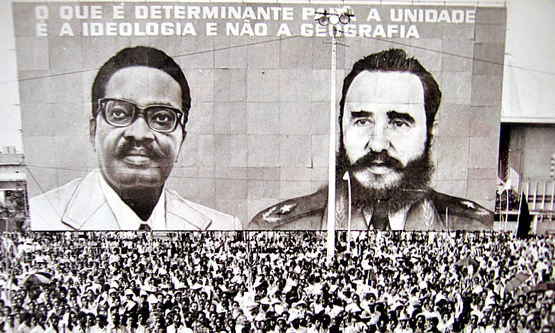
On 11 November 2015, Angola celebrated 40 years of independence from its former colonial master; Portugal. The occasion is a significant milestone for the country’s ruling party; Movimento Popular de Libertação de Angola (MPLA), which has enjoyed 40 years of uninterrupted rule. Looking at the greedy, corrupt, self-serving clique at the top of the MPLA, it is impossible not to question how a once truly revolutionary organisation, that led the heroic struggle for national liberation, which all Angolans may take pride in, has become an enemy of all that the heroes of the liberation struggle fought for.
The future of the MPLA is increasingly uncertain. Falling oil prices have hit Angola’s heavily oil dependent economy very hard (crude oil makes up 90% of Angola’s exports), forcing the government to implement budget cuts, including the removal of fuel subsidies, which had been one of the most popular policies of President José Eduardo Dos Santos’ increasingly unpopular government. In June, 17 young people, members of a book club, were arrested, and accused of reading books about non-violent protest. Initially charged with plotting a coup, they are now on trial for rebellion against the state.
Under the leadership of President Dos Santos, the MPLA has become an archetypal neo-colony. When the Portuguese banks started to feel the heat of the global financial crisis in 2010, it was wealthy Angolans who came to the rescue of their former colonial master. According to Bank of Portugal figures, Angolan investments in Portugal rose to €1.53 billion from 2010 to 2014, making Angola the only African country where outward investment exceeds the sum of foreign money flowing in. The president’s billionaire daughter Isabel Dos Santos owns 19.4% of the Portuguese Investment Bank (BPI), Portugal’s third largest financial group. In 2014 $960 million US of capital flowed out of the Angolan economy, between 2012 and 2014 external debts soared from $22 billion to $35 billion, $20 billion of which is owed to China, Angola’s biggest trading partner.
The MPLA was founded in 1956, its ideology based on Marxism-Leninism. It called for not just the ending of colonial rule, but the building of a new society. Armed opposition to colonial rule began on 4 February 1961 when 3,000 MPLA members launched an assault on the central prison and other key locations in Luanda. The uprising was unsuccessful and massive repression from the Portuguese authorities followed – hundreds if not thousands of the residents of Luanda’s poorer neighbourhoods were massacred. Difficult times followed for the MPLA. Guerrilla activities were limited to the Cabinda enclave (cut off from the rest of Angola by the Congo river) and the Dembos forest east of Luanda, the leadership was racked with factional disputes and support was withdrawn by the Organisation of African Unity (OAU) in favour of a rival organisation; the Frente Nacional de Libertação de Angola (FNLA).
A reversal of fortunes occurred in 1964, when Ernesto Ché Guevara met with then MPLA leader Agostinho Neto at the movement’s headquarters in Brazzaville, Congo (People’s Republic). Ché was impressed by Neto and promised Cuban diplomatic support and military advisors. With Cuban assistance the MPLA regained recognition from the OAU and was invited to the Afro-Asian People’s Solidarity Organisation and Tricontinental summits in Havana, Cuba. With renewed international backing (from independent African states and the socialist bloc) the MPLA was able to secure a dominant position vis-a-vis rivals FNLA and the imperialist-backed UNITA at independence, with MPLA forces seizing the capital and the majority of provincial capitals ahead of the country’s official date of independence. MPLA control of coastal towns such as Lobito, Benguela and Novo Redondo was a vital strategic advantage; when the South African army invaded from the south in support of UNITA in October 1975, these were the landing points for 20,000 Cuban troops who arrived to repel the invasion. Neto, sworn in as Angola’s first president on 11 November 1975 described Cuban support as the principal force in the MPLA’s victory at independence.
After independence South Africa continued to wage war against Angola by proxy and by direct intervention up until the ceasefire agreement on 8 August 1988. The victory of Cuban and Angolan forces over the South African army played a critical role in the ending of apartheid in South Africa and the independence of Namibia. The armed wings of the ANC and SWAPO had found sanctuary in Angola and the myth of the invulnerability of the South African army had been broken.
In contrast to the MPLA’s efforts in the struggle against Portuguese and South African imperialism, the struggle to develop the economy and to build a socialist people’s democracy has been a total failure – undermined as it has been by imperialism. Thirteen years of armed struggle to win independence followed by 27 years of civil war, devastated an economy that the Portuguese colonists didn’t even attempt to develop until faced with an armed insurgency. What little industrial base they did build collapsed as soon as they left as 300,000 Portuguese migrants fled the country, taking with them thousands of trucks and machines. Portuguese military operations had displaced nearly 2 million Angolans, almost a quarter of the population. The main food producing region, the central plateau, was the principal battlefield of the civil war, leaving the country dependent on expensive food imports.
The MPLA abandoned socialism after the 1991 collapse of the USSR with a new constitution introduced in 1992. The move was in response to US pressure, at that time Angola’s biggest trading partner. Since the end of the civil war in 2002 China has taken a leading role, holding 41% of Angola’s foreign debt.
The leaders of the MPLA long ago gave up dreams of a truly independent Angola. But the legacy of the independence struggle lives on. It is now up to the youth – who go to the streets with the cry ‘Liberdade Já‘ (freedom now) – the working class and peasants of Angola, to resurrect the cause of liberation.
Laurie Underwood




